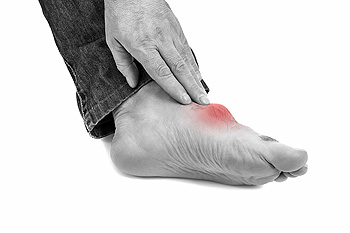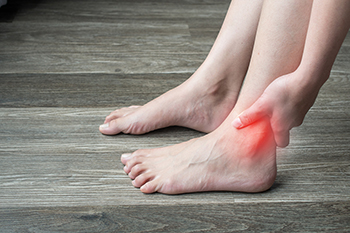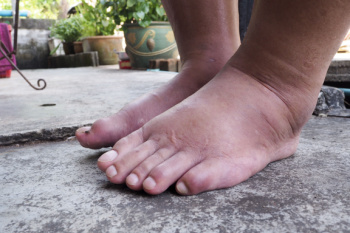
Gout is a form of inflammatory arthritis that develops when uric acid builds up in the blood and forms sharp crystals in the joints. The big toe is one of the most common locations for a gout attack due to its lower temperature and reduced circulation compared to other areas. Early signs of gout often begin suddenly and may include intense pain, swelling, redness, and warmth in the affected toe. The joint may become extremely tender, making it difficult to walk or wear shoes. These symptoms often appear during the night and can worsen quickly. Gout can be extremely painful, and may cause difficulty in completing daily activities. If you have symptoms of this condition, it is strongly suggested that you are under the care of a podiatrist who can offer you relief, management and prevention tips.
Gout is a foot condition that requires certain treatment and care. If you are seeking treatment, contact one of our podiatrists from Ankle and Foot Centers of Missouri, P.C.. Our doctors will treat your foot and ankle needs.
What Is Gout?
Gout is a type of arthritis caused by a buildup of uric acid in the bloodstream. It often develops in the foot, especially the big toe area, although it can manifest in other parts of the body as well. Gout can make walking and standing very painful and is especially common in diabetics and the obese.
People typically get gout because of a poor diet. Genetic predisposition is also a factor. The children of parents who have had gout frequently have a chance of developing it themselves.
Gout can easily be identified by redness and inflammation of the big toe and the surrounding areas of the foot. Other symptoms include extreme fatigue, joint pain, and running high fevers. Sometimes corticosteroid drugs can be prescribed to treat gout, but the best way to combat this disease is to get more exercise and eat a better diet.
If you have any questions please feel free to contact our offices located in the Greater Kansas City area . We offer the newest diagnostic and treatment technologies for all your foot and ankle needs.

Sinus tarsi syndrome is a painful condition that affects the outer part of the foot, specifically in the small cavity between the talus and calcaneus bones. Often resulting from an ankle sprain or repetitive strain, sinus tarsi syndrome leads to inflammation and instability in the area. People with flat feet or who engage in activities like running, dancing, or sports that involve quick turns or uneven surfaces, are more likely to develop sinus tarsi syndrome. Symptoms include persistent, dull pain on the outer foot, along with tenderness and a feeling of instability, which often worsens with activity or walking on uneven ground. Diagnosing this condition typically involves a physical examination and imaging tests like MRI scans. Treatment may include rest, anti-inflammatory medication, and custom orthotics for support. In more severe cases, steroid injections or even surgery may be needed for long-term relief. If you have pain on the outer part of your foot, it is suggested that you schedule an appointment with a podiatrist for a proper diagnosis and appropriate treatment.
Ankle pain can be caused by a number of problems and may be potentially serious. If you have ankle pain, consult with one of our podiatrists from Ankle and Foot Centers of Missouri, P.C.. Our doctors will assess your condition and provide you with quality foot and ankle treatment.
Ankle pain is any condition that causes pain in the ankle. Due to the fact that the ankle consists of tendons, muscles, bones, and ligaments, ankle pain can come from a number of different conditions.
Causes
The most common causes of ankle pain include:
- Types of arthritis (rheumatoid, osteoarthritis, and gout)
- Ankle sprains
- Broken ankles
- Achilles tendonitis
- Achilles tendon rupture
- Stress fractures
- Bursitis
- Tarsal tunnel syndrome
- Plantar fasciitis
Symptoms
Symptoms of ankle injury vary based upon the condition. Pain may include general pain and discomfort, swelling, aching, redness, bruising, burning or stabbing sensations, and/or loss of sensation.
Diagnosis
Due to the wide variety of potential causes of ankle pain, podiatrists will utilize a number of different methods to properly diagnose ankle pain. This can include asking for personal and family medical histories and of any recent injuries. Further diagnosis may include sensation tests, a physical examination, and potentially x-rays or other imaging tests.
Treatment
Just as the range of causes varies widely, so do treatments. Some more common treatments are rest, ice packs, keeping pressure off the foot, orthotics and braces, medication for inflammation and pain, and surgery.
If you have any questions, please feel free to contact our offices located in the Greater Kansas City area . We offer the newest diagnostic and treatment technologies for all your foot care needs.

Diabetes affects the body in many ways, and one common issue is swollen feet. High blood sugar levels can damage blood vessels and nerves, leading to poor circulation and fluid retention in the lower extremities. This swelling, known as edema, can cause discomfort and may increase the risk of infections and ulcers. Nerve damage, or neuropathy, can further complicate the issue by reducing sensation, making it difficult to notice injuries or pressure points. Poor circulation slows healing, increasing the likelihood of complications. Managing blood sugar levels, wearing supportive footwear, and elevating the feet can help reduce swelling. If you have diabetes and your feet are noticeably swollen, it is suggested that you are under the care of a podiatrist who can help you to manage this condition.
Diabetic foot care is important in preventing foot ailments such as ulcers. If you are suffering from diabetes or have any other concerns about your feet, contact one of our podiatrists from Ankle and Foot Centers of Missouri, P.C.. Our doctors can provide the care you need to keep you pain-free and on your feet.
Diabetic Foot Care
Diabetes affects millions of people every year. The condition can damage blood vessels in many parts of the body, especially the feet. Because of this, taking care of your feet is essential if you have diabetes, and having a podiatrist help monitor your foot health is highly recommended.
The Importance of Caring for Your Feet
- Routinely inspect your feet for bruises or sores.
- Wear socks that fit your feet comfortably.
- Wear comfortable shoes that provide adequate support.
Patients with diabetes should have their doctor monitor their blood levels, as blood sugar levels play such a huge role in diabetic care. Monitoring these levels on a regular basis is highly advised.
It is always best to inform your healthcare professional of any concerns you may have regarding your feet, especially for diabetic patients. Early treatment and routine foot examinations are keys to maintaining proper health, especially because severe complications can arise if proper treatment is not applied.
If you have any questions please feel free to contact our offices located in the Greater Kansas City area . We offer the newest diagnostic and treatment technologies for all your foot and ankle needs.

